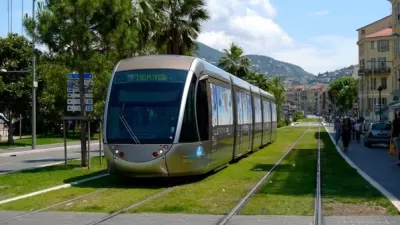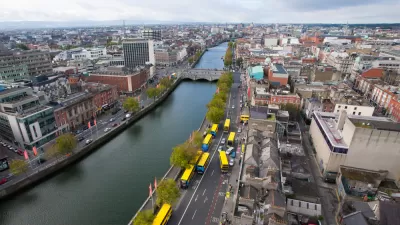Chuck Wolfe suggests three, perhaps non-traditional ideas for how to inspire acceptance of change in our cities through accessible experiences.

Writing in The Huffington Post, Chuck Wolfe provides three suggestions for advancing civic dialogue about evolving cities.
He begins with an evocative photo of the Nice, France tramway--a city-center transit line which has helped to transform a former automobile-oriented downtown, arguing:
Immersion in the real look and feel (and sometimes sound and smell) of a more compact and sustainable local experience can feed arguments for change, justify expenditures or tell how to cast a strategic election vote. Personal involvement is the most powerful and verifiable way to champion the city cause, over and above mere acceptance of empirical data, article prose and illustrations.
But how best, he asks, to inspire others' personal preferences for cities when an in-person visit to an inspirational place is not possible? How do we translate in real terms the popular arguments in favor of urban density and moderated use of the automobile?
Based on his prior writing, advocacy and research experience, Wolfe suggests and illustrates three methods to bring innovative messages home in a meaningful way:
- By example, in order to create personal meaning from an abstract goal.
- By gestalt, and the value of a surprise event that recalls something well-known.
- By local reinvention, including firsthand observation that is closer to home, where local action can supplement big ideas through demonstrable implementation.
While photographs, artwork, numbers and the written word are accessible to most, in my view, limited access to real-time experience of place is a challenge to urbanist sermons and rankings. I find that successful advocacy and implementation is more about facilitating real and personal commitment in others than in proselytizing about the abstract, and for that, we need more accessible experiences.
FULL STORY: Three Everyday Ways to Inspire Urban Change

Maui's Vacation Rental Debate Turns Ugly
Verbal attacks, misinformation campaigns and fistfights plague a high-stakes debate to convert thousands of vacation rentals into long-term housing.

Planetizen Federal Action Tracker
A weekly monitor of how Trump’s orders and actions are impacting planners and planning in America.

In Urban Planning, AI Prompting Could be the New Design Thinking
Creativity has long been key to great urban design. What if we see AI as our new creative partner?

King County Supportive Housing Program Offers Hope for Unhoused Residents
The county is taking a ‘Housing First’ approach that prioritizes getting people into housing, then offering wraparound supportive services.

Researchers Use AI to Get Clearer Picture of US Housing
Analysts are using artificial intelligence to supercharge their research by allowing them to comb through data faster. Though these AI tools can be error prone, they save time and housing researchers are optimistic about the future.

Making Shared Micromobility More Inclusive
Cities and shared mobility system operators can do more to include people with disabilities in planning and operations, per a new report.
Urban Design for Planners 1: Software Tools
This six-course series explores essential urban design concepts using open source software and equips planners with the tools they need to participate fully in the urban design process.
Planning for Universal Design
Learn the tools for implementing Universal Design in planning regulations.
planning NEXT
Appalachian Highlands Housing Partners
Mpact (founded as Rail~Volution)
City of Camden Redevelopment Agency
City of Astoria
City of Portland
City of Laramie



























